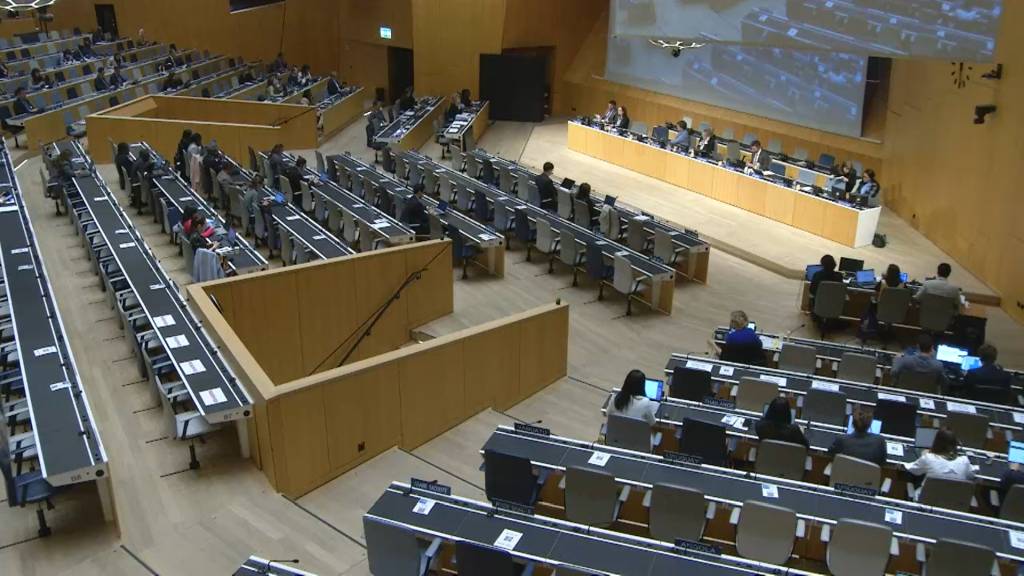The wheels of copyright diplomacy grind slow
TALKS toward a treaty to grant copyright-like rights to broadcasters continue at a snail's pace. They are doing so at the 46th meeting of the World Intellectual Property Organisation Standing Committee on Copyright and Related Rights (WIPO SCCR) in Geneva from 7 to 11 April.

The not-very-full conference hall in Geneva on 7 April
A longstanding idea on the agenda is to grant broadcasters a "neighbouring right" to copyright. Record producers have such a right, the "mechanical right" giving them the sole right to authorise use of the recording of a performance. That acts as a "gateway" - before you contact the holders of copyright in the composition and lyrics, or the performers about their rights, you need to talk to the producer. The International Federation of Journalists has long warned that a badly-crafted broadcasting treaty could have a negative effect on the rights of those who make programmes.
There is a new draft text - a Draft Treaty no less. The sticking points are: what is covered by the proposed new neighbouring right? Broadcast signal, or digital networks (that is, everything)? And transmissions by traditional broadcasters, or more?
The United States declared at the outset on Monday 7 April that it "supports updating protection for broadcasting organisations in the digital age under the terms of the 2006-2007 General Assembly mandate which calls for a signal-based approach [that is, not covering digital networks] to provide protection for the activities of broadcasting organizations in the traditional sense".
The European Union stated that "attention should be given to ensure that the Treaty is future-proof. This is why we consider that programme-carrying signals used for the transmissions over computer networks of broadcasting organisations should be granted meaningful protection."
Those contradictory contributions made it seem incredibly unlikely that a decision can be reached, since SCCR must take decisions unanimously.
However, after lunch on Monday SCCR went into "informal consultations" from which NGOs such as the IFJ are excluded. Arms were being twisted. The plenary session resumed at 16:30 Geneva time on Tuesday.
Among the public contributions was Brazil's proposal to continue discussion outside SCCR. A supporting intervention from anti-copyright forces ("Civil Society Coalition") made clear that this is intended to clear space to press forward with arguments for international law on exceptions to copyright.
There has indeed been no agreement to move on to a diplomatic conference, the step that would be required for a broadcasting treaty to become law. These negotiations began with the presentation of a consolidated text of proposals in February 2004 and now continue well into their third decade.
Exceptions to copyright
There is a continuing push, currently spearheaded by Brazil for the Latin American group of member states and by Namibia for the African Group, to set international law spelling out exceptions to copyright that countries must allow in their national law: the kind of exceptions that allow use of your work without permission or payment.
The EU opens: it "cannot support a binding instrument". The United States says that it "continues to believe that the current international framework for copyright limitations and exceptions provides the flexibility consistent with well-established international standards for countries to adopt limitations and exceptions in their national laws to advance their own social, cultural and economic policies as they see fit. We therefore do not think it is advisable at this time for the SCCR to engage in binding norm-setting work."
Those are, again, two flat "no"s to a new treaty or anything close.
The call for a treaty is largely a symbolic anti-copyright move, since the US position is in accordance with the facts. It is incredibly unlikely that any treaty would make any difference in any European or North American country. where exceptions are already in place. A slew of South American and African countries, and anti-copyright lobbyists, pursue it.
And stalwart defenders of copyright defend it. The European Writers Council reminds member states urgently "that the growing challenges of both the digital and educational crisis cannot be solved through copyright law and cannot be solved at the expense of a single group - the vulnerable authors... Instead of undermining even more rights, a healing balance needs to be introduced that actively protects the free world and the innovative power of human work and imagination - and thus the originators of the global book value chain, with millions of employees all depending on authors' private risk investments. Book writers are not paid for their labour - but only for the use of their work. Thus they depend on an appropriate remuneration for every use. Exceptions and limitations are undermining the core principle that every use must be remunerated."
The present author was due to speak for the International Federation of Journalists but online registration failed him. His written submission will follow.
The session on exceptions was over remarkably quickly. The meeting went back into "informal consultations" until the end of Wednesday.
 Unexpected support - report continued
Unexpected support - report continued
![[Freelance]](../gif/fl3H.png)